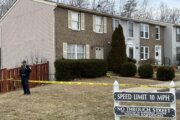WASHINGTON (AP) — A federal freeze on most evictions enacted last year is scheduled to expire July 31, after the Biden administration extended the date by a month. The moratorium, put in place by the Centers for Disease Control and Prevention in September, was the only tool keeping millions of tenants in their homes. Many of them lost jobs during the coronavirus pandemic and had fallen months behind on their rent.
Landlords successfully challenged the order in court, arguing they also had bills to pay. They pointed out that tenants could access more than $45 billion in federal money set aside to help pay rents and related expenses.
Advocates for tenants say the distribution of the money has been slow and that more time is needed to distribute it and repay landlords. Without an extension, they feared a spike in evictions and lawsuits seeking to boot out tenants who are behind on their rents.
As of June 7, roughly 3.2 million people in the U.S. said they face eviction in the next two months, according to the U.S. Census Bureau’s Household Pulse Survey. The survey measures the social and economic effects of the coronavirus pandemic every two weeks through online responses from a representative sample of U.S. households.
Here’s the situation in the District, Maryland and Virginia:
What’s the status of eviction moratoriums?
D.C. has its own local ban on evictions, imposed by the District of Columbia Council in March 2020. The city’s moratorium is tied to the public health emergency declared by Mayor Muriel Bowser, which is set to expire on July 25, about a week before the national eviction moratorium ends.
Maryland Gov. Larry Hogan has extended the state’s moratorium on evictions through Aug. 15. The state’s moratorium provides a legal defense for tenants if they can show a substantial loss of income from COVID-19. The People’s Law Library of Maryland says qualifying situations include a substantial decrease in income due to job loss, reduction in compensated hours of work or the need to miss work to care for a school-age child. A judge decides in each case whether sufficient evidence has been provided.
Virginia’s moratorium has expired, leaving only the CDC ban. Housing advocates say one of Virginia’s most significant eviction protections runs out at the end of this month. It’s a requirement that landlords apply for rent relief money on their tenants’ behalf. Renters will have to seek it out themselves.
What’s being done to help people facing eviction?
In D.C., Bowser devoted $350 million in federal aid in April to help qualifying tenants pay overdue rent and utility bills. But some members of the D.C. Council have complained that not enough people are taking advantage of the program because the eviction ban was removing any sense of urgency. In May, the council briefly considered allowing eviction filings again to prompt tenants and landlords to take advantage of the aid, but the idea was voted down amid public criticism.
Maryland has been allocated about $719 million from federal stimulus funds for emergency rental assistance, according to the state’s Department of Legislative Services. Of that, about $462 million was provided to the state government, and the remaining $257 million was given directly to local governments, the department said. These allocations are from two different pieces of federal stimulus legislation, and each has its own time frame for when the funds need to be spent.
Maryland lawmakers passed two measures this year to help people facing eviction. One codified access to legal assistance, though a measure to pay for it by increasing court filing fees failed late in the legislative session. Advocates are urging state officials to find funding elsewhere. The bill that passed also requires landlords to wait 10 days after filing a notice to evict to begin eviction proceedings. The second measure is aimed at helping tenants whose formal written lease has expired. It requires landlords who plan to end a month-to-month lease to give tenants two months’ notice.
Virginia‘s Rent Relief Program helps tenants suffering financial hardship from the pandemic. Fairfax and Chesterfield Counties administer their own programs. As of June 2, more than $240 million has been paid out statewide to nearly 40,000 households, according to the Virginia Department of Housing and Community Development. Virginia and its local governments will ultimately have access to about $1 billion in funds to help renters. The state has launched an awareness campaign, while legal aid attorneys are offering to help tenants navigate the application process.
How are the courts handling eviction hearings?
Landlords in the District are prohibited from filing for eviction for non-payment. A group of landlords had sued to be permitted to start eviction proceedings that wouldn’t be carried out until after the ban was lifted. The case remains tied up in court.
Maryland courts are fully operational, though they are still enforcing social distancing, which leads to smaller dockets. District courts are hearing landlord/tenant cases, including failure to pay rent and breach-of-lease cases. Judges have been making determinations about how much rent is due in such cases, and they have been deferring judgments until such time as the moratoriums expire.
“Sometime after Aug. 15, I’m assuming that the judges are going to begin then entering those judgments, and after that the landlords … if rent has not been paid, would be able to start eviction actions,” said Gregory Countess, director of advocacy for housing and community economic development with Maryland Legal Aid.
Eviction hearings and judgments in Virginia have continued, but at a sharply lower rate: about 10% of pre-pandemic totals during 2021’s first quarter, according to Virginia Commonwealth University’s RVA Eviction Lab. Co-directors Kathryn Howell and Ben Teresa cite various reasons, from eviction moratoriums to landlords utilizing the relief fund. Judges have also postponed cases to allow more time to apply for relief, said Martin Wegbreit, director of litigation for the Central Virginia Legal Aid Society. But courts have continued to issue some judgments, oftentimes against tenants who already moved out and failed to show up to their hearing, Howell said.
How affordable is housing in the rental market?
Affordable housing is a major problem in D.C., with rents rising as the city has become wealthier in recent years. Many Black tenants complain of being displaced by rapid gentrification. The district has long been majority Black, but that population has dropped below 50%.
Washington received more than $2.3 billion in federal funding from the American Rescue Plan, and Bowser devoted more than $500 million to a variety of programs to build more affordable housing or refurbish existing housing.
In Baltimore, Columbia and Towson, Maryland, the overall median rent was $1,600 in May, up 6.7% over the past year. The median two-bedroom rent was $1,700, up 5.5%.
More than 20% of Virginia’s rental households have people with “extremely low” incomes — and a majority of them spend half their money on housing costs and utilities, according to the National Low Income Housing Coalition. Plus, Virginia has a shortage of nearly 150,000 rental properties for people with extremely low incomes. Concerns about affordable housing are most acute in northern Virginia, outside the nation’s capital, but housing advocates say Richmond and Hampton Roads have very tight rental markets as well.
Are evictions expected to create a surge in homelessness?
According to the National Council for State Housing Agencies, tenants in D.C. owed between $66 million and $119 million in back rent as of January. The group estimated that at as many as 15,000 district residents are in danger of eviction when the ban ends.
But Bowser and the council seem intent on avoiding a surge of people losing their homes, repeatedly siding with tenants. The district’s budget is flush with federal assistance money, and a city task force has recommended that a gradual “phased end” to the eviction ban be devised when the time comes.
It’s hard to say how much homelessness in Maryland could increase when the moratoriums expire. But Countess said a survey has found that more than 200,000 families in the state are behind on rent. “Undoubtedly, there’s going to be a big increase in homelessness, if we don’t … have in place an infrastructure that’s going to get rental assistance to folks so that they can pay their past due rent,” he said.
A recent U.S. Census survey of more than 180,000 Virginians found that nearly 40,000 feared they were “very likely” to leave their home in the next two months due to eviction.
Housing advocates worry that evictions will surge, and homelessness could eventually follow, if landlords fail to tell tenants about the relief money. Some will still utilize Virginia’s relief fund, said Holly Yates, a managing attorney with the Legal Aid Society of Eastern Virginia. But she said others “won’t want to jump through any more hoops,” especially in a tight rental market where “folks who are a little bit more financially stable are lined up at the door.”
But Patrick McCloud, CEO of the Virginia Apartment Management Association, said the eviction process is far more arduous than working with a tenant applying for relief. Plus, McCloud said, “If I evict the resident, I’m never going to see that money.”
Copyright © 2026 The Associated Press. All rights reserved. This material may not be published, broadcast, written or redistributed.







